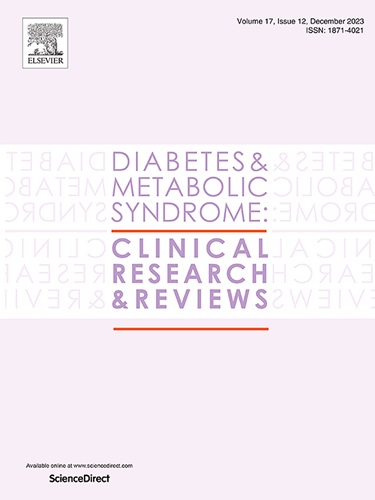Association of eating duration less than 8 h with all-cause, cardiovascular, and cancer mortality
IF 3.4
Q1 ENDOCRINOLOGY & METABOLISM
Diabetes & Metabolic Syndrome-Clinical Research & Reviews
Pub Date : 2025-07-01
DOI:10.1016/j.dsx.2025.103278
引用次数: 0
Abstract
Aims
To assess the association between eating duration less than 8 h and all-cause and cause-specific mortality.
Methods
Adult participants who reported usual intake from two valid 24-h dietary recalls were included from the National Health and Nutrition Examination Survey in 2003–2018 (n = 19,831). Mortality status as of December 2019 was obtained through linkage to the National Death Index. Average eating duration was categorized as <8, 8–<10, 10–<12, 12–14 h (mean duration), >14–16, and >16 h. Multivariable-adjusted hazard ratios (HRs) were derived.
Results
During a median follow-up of 8.1 years, compared with eating duration of 12–14 h, eating duration <8 h was robustly associated with higher cardiovascular mortality (HR, 2.35 [95 % CI, 1.39–3.98]), but not with all-cause and cancer mortality. The positive association with cardiovascular mortality remained consistent across 8 subgroups stratified by race/ethnicity, socioeconomic factors, and smoking status, and survived 14 sensitivity analyses. However, the association with all-cause mortality did not survive many sensitivity analyses.
Conclusions
Although a positive association was observed between eating duration <8 h and cardiovascular mortality, further research is required to understand whether this risk is attributed to the short eating duration itself or residual confounding resulting from its contributing factors.
进食时间少于8小时与全因死亡率、心血管死亡率和癌症死亡率的关系。
目的:评估进食时间少于8小时与全因死亡率和病因特异性死亡率之间的关系。方法:从2003-2018年国家健康与营养检查调查(n = 19,831)中纳入了两次有效的24小时饮食回顾中报告正常摄入量的成年参与者。通过与国家死亡指数的联系获得截至2019年12月的死亡率状况。平均进食时间分别为14-16小时和16小时。得出多变量校正风险比(hr)。结果:在中位随访8.1年期间,与进食持续时间12-14小时相比,进食持续时间结论:虽然观察到进食持续时间与
本文章由计算机程序翻译,如有差异,请以英文原文为准。
求助全文
约1分钟内获得全文
求助全文
来源期刊

Diabetes & Metabolic Syndrome-Clinical Research & Reviews
ENDOCRINOLOGY & METABOLISM-
CiteScore
22.90
自引率
2.00%
发文量
248
审稿时长
51 days
期刊介绍:
Diabetes and Metabolic Syndrome: Clinical Research and Reviews is the official journal of DiabetesIndia. It aims to provide a global platform for healthcare professionals, diabetes educators, and other stakeholders to submit their research on diabetes care.
Types of Publications:
Diabetes and Metabolic Syndrome: Clinical Research and Reviews publishes peer-reviewed original articles, reviews, short communications, case reports, letters to the Editor, and expert comments. Reviews and mini-reviews are particularly welcomed for areas within endocrinology undergoing rapid changes.
 求助内容:
求助内容: 应助结果提醒方式:
应助结果提醒方式:


